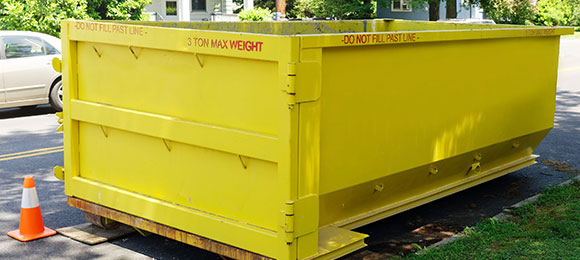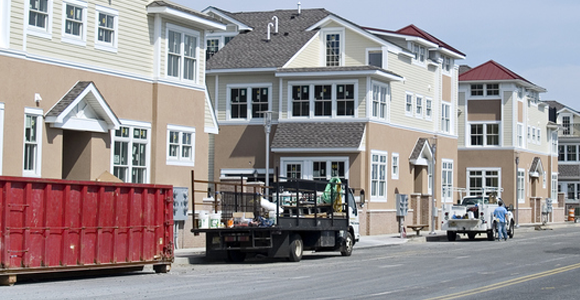
Updated September 28, 2023
Virtually every household in the U.S. contains some type of household hazardous waste.
Common items like pesticides and fertilizers, household cleaning products, and motor oil are all considered household hazardous waste.
These types of chemicals are prohibited from being disposed of in the municipal waste system as well as in most rented dumpsters.
Disposing of household hazardous waste properly is not only critical to the health of the environment, but it's critical to our own health as well.
The EPA (Environmental Protection Agency) states that in addition to avoiding combining hazardous waste with regular household trash, it’s equally as important to avoid dumping these chemicals into sewers, storm drains, and illegal dumpsites.
Chemicals can easily leach into the groundwater we drink, negatively affecting fish and other local wildlife.
In this article, we'll discuss...
- What Is Household Hazardous Waste?
- How Big of a Problem Is Household Hazardous Waste?
- How Do You Properly Dispose of Hazardous Waste?
Find dumpster rental companies in my area

What Is Household Hazardous Waste?
The EPA defines household hazardous waste as leftover household products that can catch fire, react, or explode under certain circumstances. Chemicals that are corrosive or toxic is also considered household hazardous waste.
Different products, like paint, certain cleaners, car oil, batteries, and pesticides are examples of common household products that contain hazardous ingredients and require special care when they're being disposed of.
Common examples of household hazardous waste:
- Paint cans (including empty ones with residual residue)
- Kitchen/bathroom cleaners
- Batteries (small alkaline batteries may be thrown in the trash but only in small quantities)
- Motor oil
- Bleach
- Any type of automotive fluid
- Varnish/stain
- Lawn fertilizers
- Bug and pest spray/killers
- Pool chemicals
- Medication
How Big of a Problem Is Household Hazardous Waste?

You may think that tossing a few quarts of used motor oil or a couple of nearly empty paint cans into your trash can won’t make a big impact on the environment, but this way of thinking couldn't be further from the truth.
According to the Sustainability Office at the University of Missouri, 192 million gallons of used motor oil are improperly disposed of each year in the U.S. alone.
With that being said, it just takes one gallon of used motor oil to contaminate one million gallons of water!
Flammable or reactive household chemicals release toxic fumes and are even at risk to explode if they are mixed together or exposed to certain conditions.
These harmful chemicals can cause fires, risking injuries to sanitation/disposal workers, pets, children, wildlife, and unsuspecting neighbors.
Naively thinking that small contributions of hazardous waste to the municipal trash system isn't a big deal is a harmful mentality that causes continued pollution to natural eco-systems and water sources, negatively impacts future generations of wildlife, and puts the health and safety of our friends, family, and neighbors at risk.
How Do You Properly Dispose of Hazardous Waste?

If you can’t throw household hazardous waste in your garbage can or dumpster, where can you dispose of it?
Many communities offer household hazardous waste collection days set aside for collecting these types of common toxic waste.
These local collection events are extremely successful at eliminating hazardous waste from the municipal waste system.
A small New Hampshire community hosts several of these collection events each summer, where nearly 19,000 toxic chemicals are collected and around 1,750 households participate in the event.
Contact your local waste authority to see if your community offers a similar program.
Other options are also available for certain items. For example, motor oil can be recycled at most local instant oil change centers.
Lead-acid batteries (automobile batteries) can be dropped off at the place of purchase or most auto parts stores for proper disposal.
The same is true of empty printer ink cartridges. Places that sell printer ink, like Staples, will typically allow you to bring your empty ink cartridges back to their store to be properly disposed of and/or recycled.
Other disposal options may be available in your community or through your local trash hauler.
If you have bulk household hazardous waste to dispose of, contact a local dumpster rental provider to learn more about your options.
Some dumpster rental companies can accommodate household hazardous waste in large quantities, as long as it isn't mixed in with other types of waste.
Hometown makes it easy to find and request free quotes from local dumpster rental companies in your area.
Simply enter your zip code, answer a few short questions about your dumpster rental needs, and get connected with reputable, locally-owned disposal companies in your area!
Get free dumpster rental quotes near you
Read more about dumpster rental:


